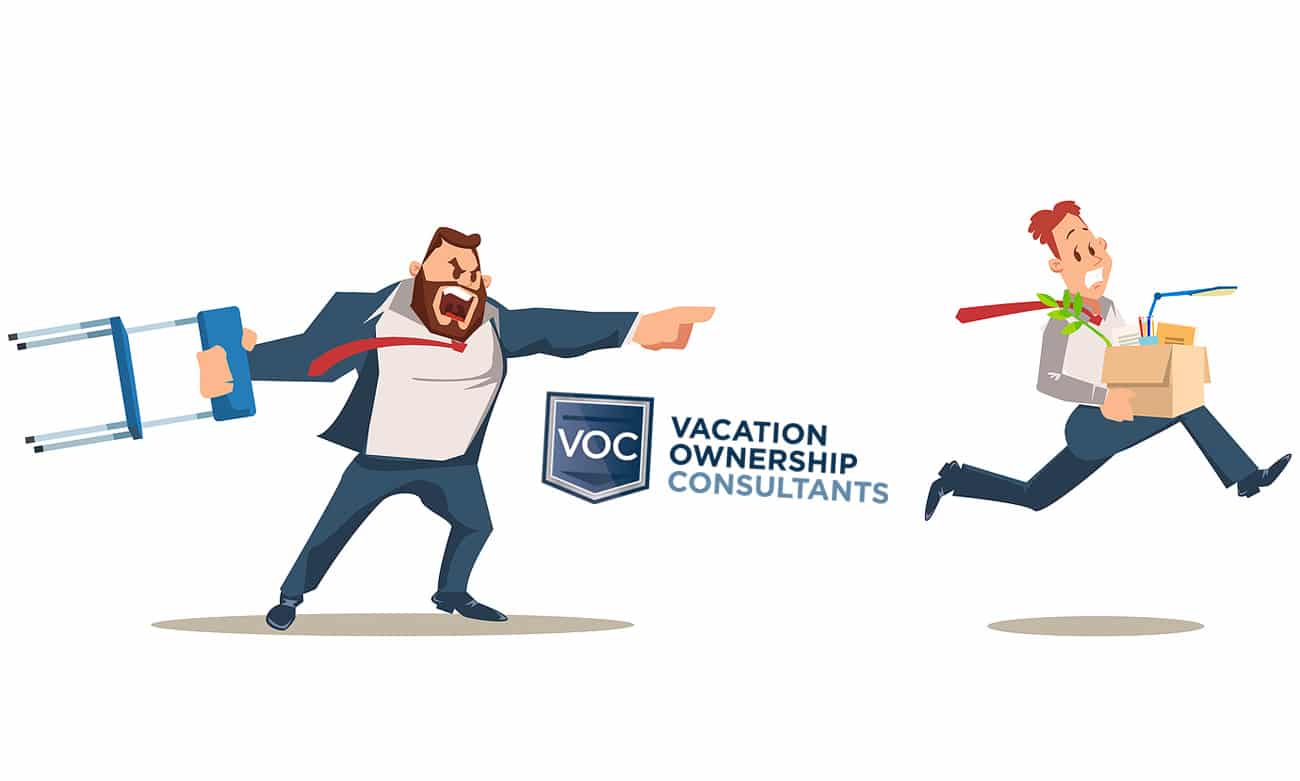Last week, we put the idea out there that timeshare employees could also be victims of the industry. While plenty of sellers make their own bed and sleep in it, many are ironically misled by the same tactics used to sell the product. Although a handful of people eventually resist timeshare work environments, many embrace the opportunity to make a lot of money. In turn, oftentimes they participate in unethical activity that hinders their ability to file wrongful termination or whistleblowing lawsuits should they lose their job.
Over the past few months, we’ve watched COVID-19 deplete the workforce of a number of companies across the country. Because of the controversy surrounding the pandemic, it’s safe to assume a number of lawsuits will spring up over the next year or so. But will this be true in timeshare land?
The fact of the matter is, the industry has been able to silence those that have resisted the timeshare workplace for decades now. Up until recently, they haven’t exactly been forced to fire those that make them a lot of money by bending the rules. Now that thousands of former timeshare employees are waiting for unemployment, will they retaliate despite their involvement or look for a similar career path?
Will Fired Timeshare Reps Retaliate or Move On?
Unlike other industries, the decisions and actions of those let go could save timeshare companies from being held accountable. At the same time, it could backfire on them exponentially. While many will probably sign a severance package or take advantage of furloughs, some are not going to be very happy. Especially if their resume is lacking and they played a key role in the success of the enterprise for an extended period of time.

When you think about it, it’s hard to be optimistic about mass amounts of embittered, aggressive salespeople entering the marketplace. It’s probably the main reason the AG and DCP of Connecticut issued a warning about timeshare relief scams earlier this month. Most ex-timeshare reps continue to prey on vacation owners in this space. Why would they change what timeshare work environments have provided them? But we can’t expect them all to thrive in a flooded exit industry.
Consequently, we believe several will begin to reflect on their sales tenure. The pandemic has had this effect on millions of people. Anticipated resistance from timeshares may not sway some from coming clean about their previous dealings within the industry. Although it’s been a tough road for whistleblowers in the past, a lack of work could result in retaliation. With that being said, let’s take a look at how timeshares disadvantage their workforce and how past resistance has been handled.
Manipulative Hiring and Training Exploits Timeshare Staff.
Understanding how people are lured into the timeshare industry is important. In most cases, the job applicants they interview consist of entry level workers without much education. This could be anywhere from high school graduates to housewives to tenured fast food workers that are looking to earn more money. The reality is, they’re not necessarily looking for honorable people with integrity driven aspirations.
For the most part, they’re looking for people with nothing to lose. A desperation for success and fortune by any means is highly coveted within the industry. For example, somebody that has been wronged in the past and has something to prove would make more sense than hiring someone building a career. They want loyalty and someone with integrity is more likely to resist timeshare work environments.

Understanding a Culture of Shady Transactions.
At the end of the day, timeshares are in the business of hiring closers– not minds or ideas. They need to fill their sales seats with people that are seeking approval, eager to please, expendable and replaceable. Overselling on the front end intrigues the simple minded and timeshares have even been known to recruit and uproot top sales reps from other companies to join their staff.
By the time training is underway, hirees are rather enthused to say the least. The problem is, the painted picture isn’t always what it seems. Although sales scripts and “effective methods” are often reviewed during onboarding sessions, “best practices” are often at the supervisor’s discretion. This means, employees may then be trained on unlawful sales tactics to close deals – if they want to be rewarded.
The Time Investment By Employees Can Be Misleading.
After going through the hiring and training processes, what would you do if you were told to “forget everything you just learned because you’ll never make a sale that way?” How about after you had success this way? Would you be able to walk away if everyone else was doing it and getting away with it? Like most Americans, any job is hard to quit during the honeymoon period. But it’s even harder once time has been invested in a trade.
Those with scarce resumes, greedy ambitions and nothing to lose rarely balk at sales misconduct. Those that resist timeshare work environments and question the operation usually find themselves backed into a corner. If the pay is good, leaving can be a tough decision to make. This creates quite the culture. In the end though, good character is normally weeded out while the bad remains rewarded.
Other Things That Darken the Timeshare Workplace.
If employees don’t quit over their integrity, something else will usually push them over the edge. Unfair working conditions have commonly been reported by ex employees. Long hours, work life imbalance, harassment, mischief, mistrust, immaturity, disrespect and shame usually causes people to despise the gig. But what really helps people resist timeshare work environments is the actuality of their incentives.
Once employees realize they’re only making a fraction of what they were promised, it doesn’t usually make sense. But it’s not always enough to get them to disengage. While some hustle and bustle to make it work and gain recognition, most find themselves clocking in just for a steady paycheck. It can be difficult to speak up about your mental state or even start over, especially if you’re inexperienced.
With all this in mind, will the pandemic change this pattern? One thing is for sure: if timeshares were held accountable for the way they hired, trained and rewarded their employees, the entire vacation ownership experience would change for the better. For the past half century, there are plenty of examples of timeshare misconduct. But don’t take our word for it.

3 Whistleblowers That Exposed Timeshare Work Environments.
For some former sales reps, the shame of their doings is a tough burden to bear. The problem is, those with remorse rarely have enough documentation to prove anything. As the past has proven, it’s awfully difficult to process restitution for misled buyers – let alone those that played a role in their entrapment. At the same time, there have been some noteworthy attempts we thought were worth mentioning.
Example 1: Hired Under False Pretenses.
After working for several timeshare sales operations, whistleblowers in Florida claimed they were “enticed by a supposed once-in-a-lifetime opportunity to be a part of the opening sales team for the new Wyndham Clearwater Beach Resort.” According to the 2017 lawsuit, plaintiffs were personally recruited by the VP, Richard Wieczerzak and promised $500K+ in annual income.
From day one, each employee claims they grew leery of the assured incentives “as they were only earning a fraction of what was represented to them.” They were also purportedly told to immediately forget their prior training and instructed to participate in a number of illegal activities to earn their keep. These allegedly involved confusing prospects with lies, selling intervals as investment properties and altering credit applications amongst other things.
Plaintiffs resisted these types of illegal timeshare work environments and began submitting complaints to “each supervisor, human resources, and eventually to corporate attorneys and investigators.” In return, one supervisor threatened to “starve them out” and fire them if they didn’t adhere. By documenting their work environment, they were able to provide evidence that suggests management was altering their rotation to limit their earnings. This case is still ongoing.
Example #2: Whistleblower Fired For Having Conscience.
In 2016, another former Wyndham employee actually received a settlement for her resistance. After being wrongfully terminated for reporting timeshare fraud on the elderly, Trish Williams blew the whistle on her experience. In her lawsuit, she stated salespeople were instructed to max out credit cards without consent, lie about interest rates, misrepresent maintenance fees and mislead buyers about resale opportunities.
The plaintiff went on the record saying she was instructed to “tell them any F%*&$ thing” to close the deal. These are the types of timeshare work environments worth resisting. In hindsight, she described the culture with a quote from one of her former colleagues. “I sold my soul to the devil. I can say whatever I want so long as I don’t put it in writing, that’s why Wyndham has good lawyers.” You can learn more by reading the article we published about the lawsuit back in 2018.

Example #3: Unfair Labor Standards Force Staff to Speak Up.
The last exemplary whistleblower filed a lawsuit after being terminated for “raising FLSA (Wages and Fair Labor Standards Act) issues.” According to the plaintiff, concern settled in after Wyndham management repeatedly asked them to “work off the clock on various Saturdays” to meet quotas. For roughly 70 weeks, (10/2015–2/2017) the sales rep worked an average of 17 overtime hours per week (1,190 total).
The lawsuit sought payment for unpaid overtime hours which were estimated to be $198 per hour. Despite making nearly $30K per month for the last 8 months of employment, the former employee was not happy with their return. Because of the unethical decision complaint to properly administer employee hours, Wyndham’s hand was forced which resulted in a settlement and the case was dismissed.
Will Vacation Ownership Ever Be Embraced?
The timeshare industry is a web of deceit that far too many consumers and salespeople get stuck in. The problem is, the general public isn’t even generally aware because timeshares have become skilled at silencing any type of resistance. While it may seem like a job opportunity in vacation ownership can be rewarding, there are other ways to find success. In the end, the reward can quite possibly turn into a path towards destruction.
Even though it’s apparent that a lot of people make good money in the industry, it’s also evident that many are never satisfied with their earnings. Others are forced to live with the regret of scamming vulnerable people. At the end of the day, resisting timeshare work environments and the purchase is a good enough reward in itself.






